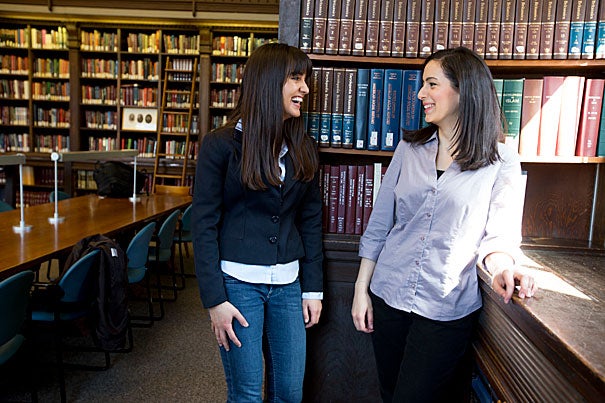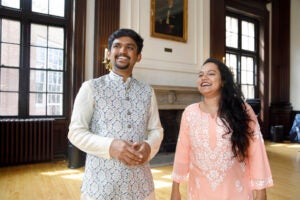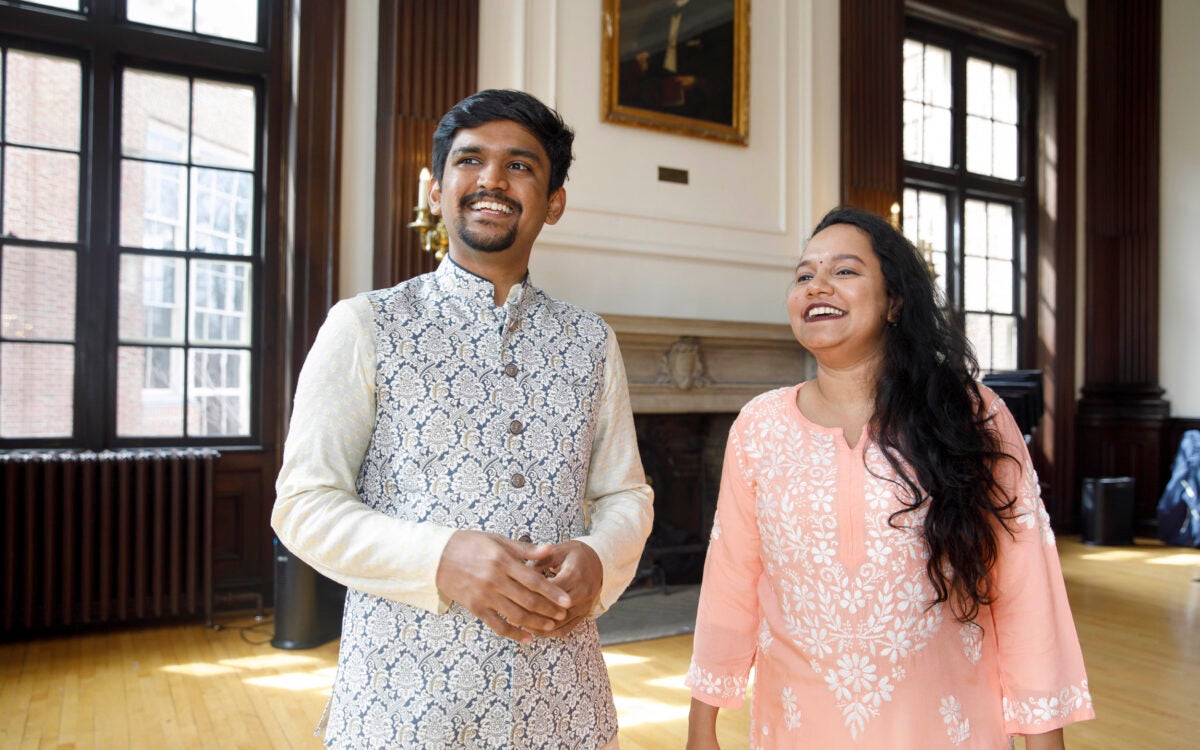
Lena Awwad ’13 (right) won the 2013 Harvard College Women’s Leadership Award for an op-ed she co-authored with Shatha I. Hussein ’14. The Harvard students focused on SAT exams being withheld from Palestinian students in the West Bank. Because of their efforts, “at least one of those students who was able to take the SATs will attend Harvard next year,” said Gina Helfrich, director of the Harvard College Women’s Center, which gives the award. The runner-up is Nadia Farjood ’13 (left), who will intern at the White House this summer.
Rose Lincoln/Harvard Staff Photographer
Recognizing exceptional women
Three honored at 16th Women’s Leadership Awards
In 2012, when a journalist asked the White House about Israeli authorities withholding SAT exams intended for Palestinian students in the West Bank, it was a question that had been prompted by an op-ed written by two Harvard students.
“Israel vs. No. 2 Pencils” by Lena Awwad ’13 and Shatha I. Hussein ’14 argued that the move had had a devastating effect on Palestinian students hoping to attend colleges such as Harvard. When “not a single U.S. news source picked up the story of the SAT hold-up in Palestine,” the Harvard Crimson published it, according to Gina Helfrich, director of the Harvard College Women’s Center.
In a clear nod to the op-ed, the White House soon released a daily briefing that said the issue had been resolved and that Palestinian students would be able to take the SATs — “so they should sharpen their No. 2 pencils.”
Because of Awwad and Hussein’s efforts, Helfrich said, “at least one of those students who was able to take the SATs will attend Harvard next year” — and the Center took note, honoring Awwad with the 2013 Harvard College Women’s Leadership Award.
Faculty, staff, and students recently flocked to the Charles Hotel to recognize Awwad and two other outstanding Harvard University women. Nadia Farjood ’13 accepted an honorable mention, and Kathleen McCartney, dean of the Graduate School of Education and president-elect of Smith College, was presented with the 2013 Women’s Professional Achievement Award.
Coordinated by the Women’s Center, the annual awards, now in their 16th year, are made possible by support from Terrie Fried Bloom ’75 and have a legacy of distinguished past recipients, including astronaut Stephanie Wilson ’88 and Tina Tchen ’78, chief of staff to first lady Michelle Obama.
Accepting her award, Awwad emphasized her belief that leadership is “the ability to fight not only for one’s own rights, but for the rights of others, especially when they’re not able to do it themselves.”
In addition to thanking her family, she thanked the “difficult circumstances” she had witnessed and encountered in her native country of Palestine — “the poverty, the hardship, the checkpoints … they made me the person who I am today” — but she dedicated her award to Harvard itself.
“This institution has given me so much,” Awwad said. “It has allowed me to develop as a person and as a woman, and I can only hope that a privilege like this will be extended to students from Palestine and around the world.”
“We have many great traditions here at Harvard, and this is one of my favorites,” said Diana Sorensen, dean of Arts and Humanities and the James F. Rothenberg Professor of Romance Languages and Literatures and of Comparative Literature. “It is one of the more recent traditions, but it is absolutely central.”
In introducing McCartney, Sorensen honored her for “her history of supporting women in leadership roles, for encouraging diversity, and for her brilliant academic achievements in early childhood development education.” She added that McCartney would be missed “as a friend, and as a role model.”
McCartney, a “first-generation college student” and a native of Medford, Mass., said that the world had changed “since I was the age of the young women being honored here tonight.” She recalled that during her undergraduate years at Tufts University, male students would rate female students on their physical attractiveness, “literally holding up signs” as the women passed by.
Despite such challenges, McCartney said, a series of sponsors and “intellectual mothers” helped her find her way, people who used their influence to advocate on her behalf. “They saw something in me that I just didn’t see in myself,” McCartney said, adding that she felt “so honored to lead the Graduate School of Education for the past eight years … it really has felt like an eight-year honeymoon.”
Graduate student Shauna Shames ’01, who nominated Farjood, called the honorable mention recipient “a force of nature” who had just received funding from the Harvard Kennedy School’s Women and Public Policy Program to pursue a summer internship at the White House.
Shames said that when Farjood discovered that Harvard had no course on women in politics, she decided to create one. Putting together a team of student researchers, Farjood collected student signatures to demonstrate interest and demand, conducted peer-institution research showing that Yale and Princeton offered such courses, and wrote and delivered a report of their findings to Harvard administrators. The result, Shames said, is the lecture course “Women and U.S. Politics,” which will debut at Harvard next year.
Commending Farjood’s determination and vision, Shames thanked her “for all you do, for all that you have done already, and all that you will do, for us.”




